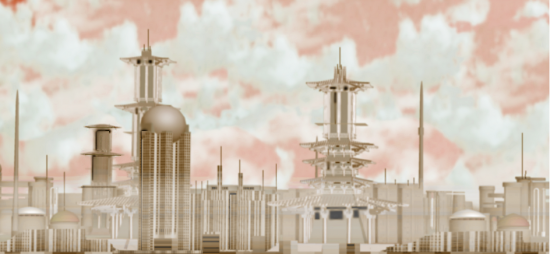BY LETTER
Huanghua
 Image from Steve Bowers | |
| Huanghua rotates in a retrograde fashion, and is slowly becoming tidally locked with the local star | |
Huanghua, Yellow Flower; formerly Sulphur Blossom | |
| World | Yellow Flower (originally Liu Huanghua, Sulphur Blossom) |
|---|---|
| Star | AC+65 6955, Gliese 793 |
| Location | 25.95 light years from Sol |
| Constellation | Cepheus |
| Class | M3V |
| Orbit | 0.2 A.U. |
| Period | 0.21 years |
The Qin Shi Huang
During the Great Expulsion a number of large Arks were constructed by the agents of the Earth Goddess to carry large numbers of refugees from the Solar System. From more than three billion Chinese nationals who had been expelled from Earth, a hundred thousand could be accommodated aboard each vessel in a state of vitrified cryostasis. Ark Qin Shi Huang was constructed in Earth Orbit largely from material launched into space by one or another of the various high-volume surface-to-orbit launch systems built by GAIA to enable the expulsion of the human population.The original plan was for the Qin Shi Huang to travel to Sigma Draconis and the Penglai colony. However before launch the refugees elected a ruling committee of representatives, who were heavily influenced by Neotaoist ideas of independence. The representatives decided to divert the craft to Gliese 793, a small star quite close to Penglai which had a potentially terraformable planet. The arkship AI pilot agreed to this course of action, apparently out of curiosity about this unexplored system. At this time the ruling cadre of representatives enforced strict rules about the data that would be permitted to be taken to this new world; an edited version of human history, technology and religion would accompany the refugees, in an effort to edit out some of the mistakes that led to the chaos of the Technocalypse.
The vessel left the Solar System in 665 AT, and arrived in 920. Thanks to the relatively efficient design of the craft and cryostasis equipment by the agents of the Goddess, fewer than 10% of the frozen colonists suffered any significant trauma during the flight; a much better ratio than found on human-built 'backyarder' vessels of this era.
On arrival the Qin Shi Huang settled into orbit around the single terrestrial world, a Cytherean world with a cloudy atmosphere of sulphuric acid clouds and a resonant retrograde rotation. This planet was named at that time Liu Huanghua, Sulphur Blossom, because of the exotic and beautiful native sulphur crystal formations that were scattered over the surface. The Gliese 793 system is relatively young, and the planet had not yet lost all its water, nor become fully tidally locked. Several quite large icy bodies were diverted from the outer system using a small fleet of interplanetary vessels, each of which used one of the arkship's cluster of drive motors. A single drive motor was commandeered by the arkship AI, which used it in the construction of a personal interstellar probe and set off on a journey of exploration; this ship was never seen again.
The Federation Period
The new Liu Huanghua colony maintained laser contact with the Sigma Draconis system seven light years away, even during the chaos of Penglai's Dirty War period. However for two hundred years no contact could be made with Sol System. Then in 971 an invitation to join the First Federation arrived from Vesta, and after exchanging messages with Penglai, Liu Huanghua joined the Federation in 986. At first membership of the Federation meant little more than an increase in message traffic, but gradually some of the technological advances being made in Solsys and elsewhere started to make an effect. At length a few interstellar trading vessels began to arrive, firstly from Penglai and in 1120 a small fleet of vessels from Solsys belonging to the SecureSpace megacorp arrived to assist in the development of the system.For three hundred more years SecureSpace and the Sulphur Blossom colonists worked to improve their world, oxygenating the atmosphere and fixing the sulphur into gypsum. Finally the ocean was respectably deep, the soil tolerably sulphur free and the atmosphere more or less breathable, but the world was still far from Earthlike.
Most of the starlight on the planet arrived in the form of infrared radiation, but not enough to warm the planet above the freezing point of water. Once the heat of impact and the exothermic reaction from the oxygenation process had dissipated, the seas began to freeze. Worse than that, the young red dwarf would emit bright flares, flooding the planet with ultraviolet and causing problems for the developing biosphere.
For this reason a large Lagrange parasol/magshield was constructed by SecureSpace in the planet's L1 point, modified to absorb the excess IR and UV radiation from the star and emit a steady flow of visible light toward the planet. This structure was completed in 1488, and marked the point in time when the environment on Liu Huanghua became comfortably habitable. At last humans could live on the surface, and the construction of spacious and aesthetically pleasing towns and cities commenced.
 Image from Steve Bowers | |
| Jiangsu City, Huanghua | |
The Penglai Empire Period
In 1683 the Penglai Evolution movement reached Sulphur Blossom, causing the ruling Federation faction to collapse. In the ensuing chaos the SecureSpace megacorp representatives moved to take over the reigns of government, and the world became a corporate state. Like Penglai, Sulphur Blossom left the Federation at this point, and the corporate world looked towards the newly formed NoCoZo for leadership. But over time the independent streak of Neotaoist thought influenced the SecureSpace local management towards self-sufficiency, and by 2000 the world broke away from both the Penglai Empire and the SecureSpace interstellar hegemony. Sulphur Blossom now became an independent world, and formally changed its name to the more clement Huanghua (Yellow Flower).The Revolt of the Ancestors
Because of the restrictions on data transfer from Solsys during the arkship journey from Solsys, life extension, neural interfacing and uploading technology were relatively primitive in the Gliese 793 system for many centuries. During this period a strong element of ancestor worship and reverence for the dead developed, leading to the independent development of a form of personality simulation, which could act as a record of the ancestor after death. Because these simulations did not involve neural interfacing or memory uploading these so-called Ancestor Recordings were very crude at first, no more than a mimicry of the departed; but over time the simulations became more sophisticated, and were often consulted as advisors by the living.From the First Federation period onwards more advanced forms of neurotechnology arrived, so that better copies of a citizen's mindstate could be made and incorporated into the Ancestor Recordings. Some individuals opted to become Ancestors long before they finished their natural life, and as life extension technology became more widely available the option to become an Ancestor became much more of a voluntary lifestyle choice. However the role of the Ancestors was still very much that of an advisor to the living; programmed constraints on the behaviour of the Ancestors restricted their freedom of action considerably.
During the Integration Ancestors could not participate in government on the world of Yellow Flower, nor own physical assets or leave the planet. At a time when virtual entities were gaining more rights on other worlds throughout the Terragen Sphere, the Ancestors of Yellow Flower were still essentially powerless.
In 4077 a number of senior Ancestors managed to combine forces and become transapient, suddenly changing the toposophic landscape of the world altogether. There is considerable evidence to suggest that this development was the result of outside assistance, perhaps from the Cyberian Network. Despite some resistance from the human nearbaseline population, the virtual entities that had previously been subservient advisors suddenly became self-willed and self-interested.
A period of strife ensued, and some newly liberated virtual entities acquired the physical means to commit acts of violence against the incorporated. At this time virtual was turned against virtual, and humans sympathetic to the various factions were used as pawns in the conflict. Eventually many Ancestors and other non-physical entities left Huanghua altogether, some to live in newly constructed substrates inside the single gas giant in the system, and some emigrated to live in virtual environments flung far across the civilised galaxy. The Ancestors which have remained on Huanghua are more amenable to their human companions, but are now treated with due respect and afforded full sentient rights.
Huanghua was occupied by the Solar Dominion during the Version War, and has retained some ties with that empire ever since; but the majority of the population are generally more sympathetic with Penglai and the other former members of the short-lived Penglai Empire. Even after nearly ten millennia of history the people of HuangHua self-identify as Chinese, although many waves of emigration and immigration have diluted the population considerably.
Image from Steve Bowers | |
| The Flag of Huanghua, derived from the Yellow Flag of the Qing Dynasty of Earth | |
Related Articles
Appears in Topics
Development Notes
Text by Steve Bowers
Initially published on 07 April 2010.
Initially published on 07 April 2010.






